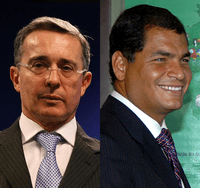Since taking office in 2002, Colombian President Álvaro Uribe has not wavered from his campaign promise to use a "firm hand" to eliminate the Revolutionary Armed Forces of Colombia (FARC). By all indications, Colombia's counterinsurgency effort has been largely effective in weakening the rebel group, considered to be a terrorist organization by the United States and European Union for its involvement in high-profile kidnappings and drug trafficking. But an unintended side effect of Uribe's tough approach has been the deterioration of Colombia's bilateral relations with Ecuador and Venezuela. Colombia has accused its neighbors of being sympathetic to the FARC and letting the rebel group use Ecuadorian and Venezuelan territory -- in the thick jungles that make up a sizeable portion of Colombia's border with both countries -- for safe haven. In turn, both nations have accused Colombia of military aggression and violations of sovereignty. The largest row to date occurred immediately after March 1, 2008, attacks by Colombian soldiers in a dense jungle zone known as Angostura that straddles the Colombia-Ecuador border. In the covert operation, Colombian soldiers crossed into Ecuador, acting on information that the FARC's then-second in command, Raúl Reyes, was in the vicinity. They were right: Reyes was killed, delivering a huge blow to the FARC's command structure.
Colombia, Ecuador Tensions Still High a Year Later

